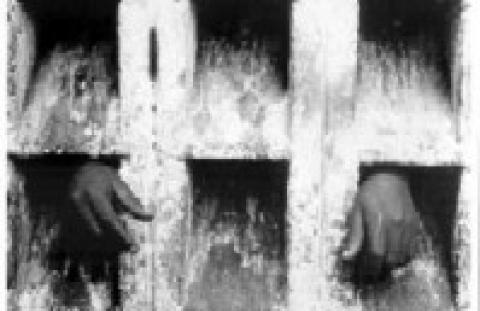
The following article was written by Kelly Kundrat, a Maryknoll Office for Global Concerns intern, and was published in the January-February 2014 NewsNotes.
"Beza, a Christian woman fleeing religious persecution in Eritrea, arrived at the U.S. port of entry at Hidalgo, TX, and asked for protection. ‘I was shocked,’ she explained. ‘I walked to the border to ask for asylum and was put into a small cell with eight people. There was a toilet in the middle. I was there for 24 hours with nothing—no blanket or mattress, just a cement bench. It was so cold.’" From Tortured and Detained: Survivor Stories of U.S. Immigration Detention 2013
On December 10, International Human Rights Day, four torture survivors and staff from the Torture Abolition and Survivor Support Coalition (TASSC) met with Congressional leaders to discuss immigration detainment of torture survivors in the U.S. The survivors recounted the experience of torture, their journeys, and subsequent detainment upon entry in the U.S.
When sharing her story, Marie*, a torture survivor, explained she had no idea what political asylum was upon entering the U.S. Marie crossed the Mexican border, five years after escaping prison in her repressive home country in Western Africa. Although she herself had never been involved in politics, she was abducted, raped, and tortured by government officials because of her father’s political activities. After arriving in the U.S., she was kept in a harsh jail-like facility, reminiscent of the horrific experiences she escaped. Terrified of being returned home, Marie was made to endure further hardships within the detention facility even with a legitimate claim to political asylum. Had Marie been assisted by the U.S. Department of Justice’s Legal Orientation Program (LOP) – an informative service only offered in 10 percent of immigrant detention facilities – she would have understood her legal options, thereby shortening her time in the harsh conditions of detainment.
Another torture survivor, Haile*, spoke of enduring humiliation through showering naked in front of others within the U.S. immigrant detention facility. "I come from a traditional Christian family," he said. "It was the first time I was ever naked in public." Haile was released after six months in U.S. detention.
The congressional staffers were given copies of Tortured and Detained: Survivor Stories of U.S. Immigration Detention, a report issued by TASSC, the Center for Victims of Torture (CVT) and the Unitarian Universalist Service Committee. Along with the meetings was a congressional briefing, featuring speakers from TASSC, CVT, Human Rights First, the Lutheran Immigration and Refugee Service and the National Immigrant Justice Center. The event was co-sponsored by the Bipartisan Congressional Women’s Working Group on Immigration Reform.
"Tortured and Detained" is a report on the experiences of 20 international torture survivors -- men and women from across the globe -- who went through mandatory immigration detainment upon entry into the U.S., held in prison facilities and detention centers. All 20 individuals were political asylum seekers, meaning they had political asylum status, were seeking political asylum status, or were still detained within the U.S. prison system awaiting the ability to seek political asylum.
The purpose of the report, as well as the Congressional visits and briefing in December, was to push for inclusion of the positive provisions within HR 15, the "Border Security, Economic Opportunity, and Immigration Modernization Act"; bolster the use of alternatives to detention; and expand access to LOPs.
In the 2003 pastoral letter Strangers No Longer: Together on the Journey of Hope the U.S. Conference of Catholic Bishops (USCCB) stated, "Those who flee wars and persecution should be protected by the global community. This requires, at a minimum, that migrants have a right to claim refugee status without incarceration and to have their claims fully considered by a competent authority."
Later, in the 2011 piece The Catholic Church’s Teaching on Immigration Enforcement, the USCCB stated, "Immigration policy should prioritize the use of alternatives to detention for those who do not threaten public safety or national security. U.S. immigration policy should provide meaningful protection to refugees and asylum seekers by eliminating the one year filing deadline, providing appropriate screening by a qualified adjudicator for all asylees, and eliminating mandatory detention of asylum seekers among other measures."
*Names have been changed to protect survivors’ anonymity.
Faith in action:
TASSC has created this petition to help torture survivors in detention facilities gain access to the Legal Orientation Program (LOP). Signatures will be presented to officials in the Justice Department’s Executive Office of Immigration Review.
